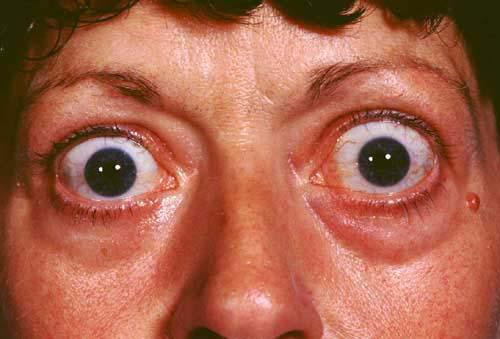Definisi
Penyakit Graves atau Graves' disease adalah penyakit autoimun yang menyebabkan produksi hormon tiroid berlebih (hipertiroidisme). Walaupun terdapat beberapa penyakit yang dapat menyebabkan hipertiroidisme, penyakit Graves merupakan salah satu penyebab hipertiroidisme yang cukup umum.
Tiroid merupakan sebuah kelenjar kecil, berbentuk seperti kupu-kupu yang berada di leher bagian depan. Tugas utama kelenjar tiroid adalah untuk mengatur kecepatan metabolisme tubuh, yakni proses tubuh untuk mengubah makanan menjadi energi.
Penyakit Graves sendiri diambil dari nama Robert Graves, seorang dokter asal Irlandia yang pertama kali menemukan kondisi ini pada tahun 1800-an.
Hormon tiroid memengaruhi berbagai sistem dalam tubuh, diantaranya adalah jantung, otot, tulang, mata, kulit, dan liver. Oleh karena itu, gejala dari penyakit Graves dapat bermacam-macam. Walaupun penyakit ini dapat menyerang siapa saja, namun lebih sering dialami oleh wanita dan mereka yang berusia dibawah 40 tahun.
Tujuan utama dari pengobatan penyakit Graves adalah untuk menurunkan jumlah hormon tiroid yang diproduksi tubuh dan mengurangi keparahan gejala.
Penyebab
Karena penyakit Graves adalah kondisi autoimun, maka secara garis besar disebabkan oleh tidak berfungsinya sistem kekebalan tubuh dalam melawan penyakit. Hal ini masih tidak diketahui secara pasti mengapa bisa terjadi.
Sistem kekebalan tubuh secara normalnya akan menghasilkan antibodi yang dirancang untuk menargetkan virus, bakteri, atau zat asing lainnya. Pada kondisi penyakit Graves, sistem kekebalan tubuh menghasilkan antibodi terhadap salah satu bagian sel di kelenjar tiroid.
Secara khas, penyakit Graves dapat menyebabkan kondisi Graves Ophthalmopathy. Kondisi ini disebabkan oleh penumpukan karbohidrat di otot sekitar mata yang penyebabnya juga masih belum diketahui secara pasti.
Faktor Risiko
Meskipun penyakit Graves dapat menyerang siapa saja, namun terdapat beberapa faktor yang dapat meningkatkan risiko seseorang mengalami penyakit Graves, antara lain:
- Riwayat keluarga
- Risiko Anda mengalami penyakit Graves meningkat bila Anda memiliki riwayat keluarga dengan penyakit tiroid
- Jenis kelamin
- Penyakit Graves lebih sering terjadi pada wanita dibandingkan pria
- Usia
- Penyakit Graves seringkali ditemukan pada usia di bawah 40 tahun atau diantara usia 30-50 tahun. Tetapi tidak menutup kemungkinan dapat mengenai anak-anak dan lanjut usia
- Kehamilan
- Wanita hamil juga memiliki risiko lebih tinggi untuk terkena penyakit Graves. Sampai saat ini masih tidak diketahui secara pasti mengapa, namun diyakini adanya hubungan dengan perubahan hormon saat hamil
- Merokok
- Merokok dapat memengaruhi sistem imun tubuh sehingga dapat meningkatkan risiko terjadinya penyakit Graves
- Menderita penyakit autoimun lain
- Risiko untuk terkena penyakit Graves dapat meningkat bila mengalami penyakit autoimun lain seperti artritis rematoid, lupus, diabetes tipe 1, penyakit celiac, dan vitiligo
Baca Juga: Penyakit Vitiligo - Definisi, Penyebab, Gejala, dan Tata Laksana | AI Care (ai-care.id)
Gejala
Gejala dari penyakit Graves berkembang secara perlahan, bahkan dapat membutuhkan waktu beberapa minggu hingga bulan untuk muncul. Gejalanya dapat bervariasi dikarenakan perjalanan penyakitnya yang dapat memengaruhi banyak sistem dalam tubuh, antara lain:
- Gangguan kecemasan
- Permasalahan tidur
- Sulit berkonsentrasi
- Kelelahan
- Rambut rontok
- Diare atau sering buang air besar
- Peningkatan produksi keringat
- Peningkatan nafsu makan dengan berat yang terus turun
- Siklus menstruasi yang tidak teratur
- Kelelahan otot terutama pada pinggang dan bahu
- Gangguan mood
- Jantung berdebar atau laju denyut jantung cepat (takikardia)
- Sesak napas
- Tremor (gemetar)
- Pandangan ganda atau gangguan penglihatan
Diagnosis
Untuk mendiagnosis penyakit Graves diperlukan anamnesis atau wawancara antar dokter dan pasien. Dokter akan menanyakan keluhan utama pasien, keluhan penyerta, riwayat penyakit pasien, riwayat penyakit keluarga, riwayat pengobatan, dan gaya hidup.
Selanjutnya, dokter juga akan melakukan pemeriksaan fisik. Pemeriksaan fisik yang dilakukan meliputi pemeriksaan tanda vital yang terdiri dari tekanan darah, laju napas, nadi, dan suhu tubuh.
Kemudian dokter akan melakukan pemeriksaan fisik dari ujung kepala hingga ujung kaki. Pemeriksaan tersebut meliputi pemeriksaan dengan stetoskop dan pemeriksaan pada kelenjar tiroid yang terletak pada bagian leher.
Dokter juga dapat melakukan pemeriksaan selanjutnya berupa pemeriksaan penunjang. Pemeriksaan penunjang yang dapat dilakukan adalah:
- Tes darah untuk memeriksa kadar hormon tiroid dalam tubuh
- Pemeriksaan antibodi untuk mencari antibodi penyebab penyakit Graves
- Tes yodium radioaktif untuk menilai fungsi dari kelenjar tiroid dengan cara menelan zat yodium radioaktif dalam dosis yang kecil
- Pemeriksaan USG untuk melihat adanya pembesaran pada kelenjar tiroid dan membantu mendeteksi aliran darah pada pasien dengan penyakit Grave
Tata Laksana
Karena penyakit Graves merupakan kondisi yang kronis dan berlangsung dalam jangka waktu yang cukup lama, tata laksana harus dilakukan secara berkelanjutan. Tata laksana meliputi:
- Pemberian obat-obatan
Obat-obatan golongan pemblokir reseptor beta atau dikenal juga dengan nama beta-blocker, serta obat-obatan antitiroid dapat membantu mengurangi gejala. Penggunaan obat-obat tersebut harus diberikan di bawah pengawasan dokter yang merawat.
- Terapi radioiodin
Terapi ini menggunakan bahan iodin radioaktif dalam bentuk pil atau cairan.
- Operasi tiroid
Operasi tiroidektomi menghilangkan seluruh bagian kelenjar tiroid. Setelah tindakan ini, biasanya akan ada penurunan produksi hormon tiroid secara drastis sehingga pasien dapat mengalami kondisi hipotiroidisme. Bila hal ini terjadi, ada kemungkinan Anda harus mengonsumsi obat pengganti hormon seumur hidup.
Pemilihan jenis tata laksana yang tepat dilakukan oleh dokter yang merawat. Seluruh tata laksana memiliki keuntungan serta risiko masing-masing. Bila diobati dengan baik, penyakit Graves dapat memberikan keluaran atau hasil yang baik. Namun perlu diperhatikan bahwa tata laksana dari penyakit Graves memerlukan waktu yang cukup lama.
Komplikasi
Bila tidak diobati dengan baik, penyakit Graves dapat menyebabkan beberapa komplikasi seperti:
- Masalah jantung
Jika tidak diobati, penyakit Graves dapat menyebabkan gangguan irama jantung, perubahan fungsi dan struktur otot jantung, serta gagal jantung (ketidakmampuan jantung untuk memompa darah ke seluruh tubuh).
- Osteoporosis
Penyakit Graves yang tidak mendapatkan pengobatan yang tepat, dapat menyebabkan terjadinya osteoporosis.
- Badai tiroid
Badai tiroid atau krisis tiroid terjadi ketika kelenjar tiroid mengeluarkan jumlah hormon tiroid yang sangat banyak dalam waktu yang singkat. Kondisi ini merupakan komplikasi yang cukup jarang dan dapat terjadi bila Anda menghentikan konsumsi obat hipertiroid secara mendadak. Kondisi ini adalah kondisi gawat darurat dan dapat menyebabkan kematian.
Baca Juga: Penyakit Osteoporosis - Definisi, Penyebab, Gejala, dan Tata Laksana | AI Care (ai-care.id)
Pencegahan
Karena penyakit Graves merupakan penyakit autoimun, tidak ada cara khusus untuk mencegah penyakit ini. Namun, Anda dapat menurunkan risiko terjadinya penyakit ini dengan cara:
- Mengelola stres dengan baik
- Tidak merokok
- Rutin melakukan pemeriksaan saat sedang hamil
- Menerapkan pola hidup sehat
Kapan Harus ke Dokter?
Sejumlah kondisi medis dapat menyebabkan tanda dan gejala yang berhubungan dengan penyakit Graves. Segera ke dokter bila Anda mengalami gejala terkait penyakit Graves. Penanganan yang cepat dan tepat dapat mencegah terjadinya berbagai komplikasi.
Cari pertolongan darurat jika Anda mengalami tanda dan gejala yang berhubungan dengan jantung, seperti detak jantung yang cepat atau tidak teratur, atau jika Anda kehilangan penglihatan.
Mau tahu informasi seputar penyakit lainnya? Cek di sini, ya!
- dr Nadia Opmalina
Cleveland Clinic - Grave's Disease. (2022). Retrieved 23 February 2023, from https://my.clevelandclinic.org/health/diseases/15244-graves-disease
Mayo Clinic - Grave's Disease. (2022). Retrieved 23 February 2023, from https://www.mayoclinic.org/diseases-conditions/graves-disease/symptoms-causes/syc-20356240#:~:text=Graves'%20disease%20is%20caused%20by,bacterium%20or%20other%20foreign%20substance
Mount sinai - Graves disease information. (2020). Retrieved 23 February 2023, from https://www.mountsinai.org/health-library/diseases-conditions/graves-disease
WebMD - Grave's Disease. (2022). Retrieved 23 February 2023, from https://www.webmd.com/women/understanding-graves-disease-basics











